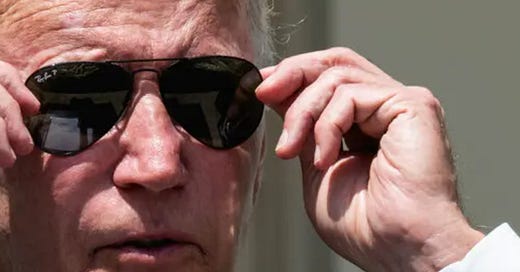Biden’s grand and dangerous vision
He hasn’t quite articulated it, but it’s guiding his presidency, and it’s scary
Early this month Edward Wong of the New York Times wrote a piece that deserves more attention than it’s gotten. It’s about the Biden administration’s grand unified mission statement—a statement that Biden himself hasn’t quite articulated but that does seem to be, increasingly, guiding his presidency.
And when I say grand unified mission statement, I mean grand unified mission statement. This is a mission statement that:
1) ties Biden’s overarching foreign policy narrative to what is becoming his overarching domestic political narrative;
2) suggests—correctly, I think!—that Biden is navigating America, and the world, through what will be seen by posterity as a momentous crossroads in world history;
3) suggests—incorrectly, I think!—that Biden is handling this navigation well, and that posterity will judge him favorably.
I’m tempted to say Biden is taking a wrong turn at this crossroads, but in a sense the problem is worse than that. I think he’s confused about which momentous crossroads in world history we’re at—a disorientation that’s unlikely to lead us to a good place.
Wong’s piece, written right after Biden’s “soul of the nation” speech, notes the thematic overlap between that speech and Biden’s foreign policy. His speech depicted “MAGA Republicans” as a threat to the foundations of American democracy, and his foreign policy has long been framed—by him and by Secretary of State Antony Blinken—as a global struggle on behalf of democracy against autocracy and authoritarianism.
The congruence of these two narratives has strong political appeal, Wong says. “Pursuing parallel policies to strengthen democracy at home and abroad allows the Biden administration to focus on a single central message, while the president’s political aides shape the identity of the Democratic Party around it.”
I think these two quests have something in common other than being crusades on behalf of democracy. Both stand a good chance of being self-defeating, making the problems they’re intended to solve worse, not better.
And that’s not the half of it. Pursuing these two crusades the way Biden is pursuing them could make other problems—even bigger problems, global problems of epic consequence—much worse. That’s why I think future historians may well look back at the Biden administration and render this triply unflattering judgment:
(1) Biden did a bad job of navigation at the crossroads he was focused on. (2) The crossroads he was focused on was less important than a second, more momentous crossroads. (3) In the course of giving us a bum steer at the first crossroads he gave us a bum steer at the second crossroads.
I hope I’m wrong! But if you want to see why I think I’m right, it helps to exercise your cognitive empathy—try to imagine how things look from the other side of the battle lines over democracy’s future that Biden is drawing. To begin with:



